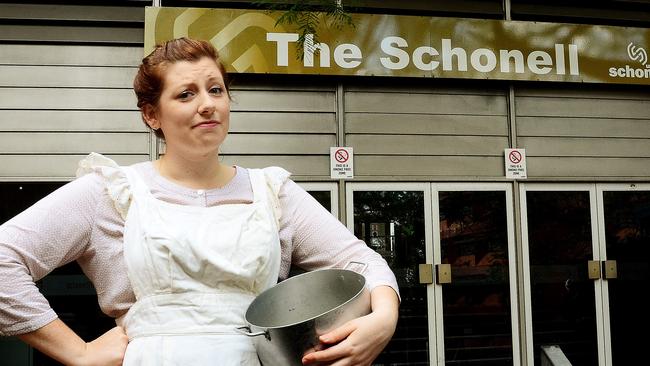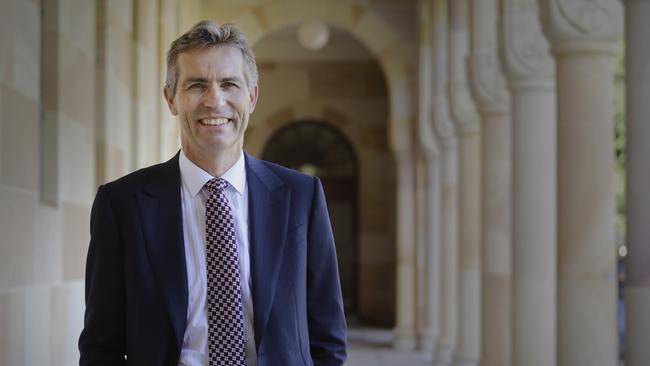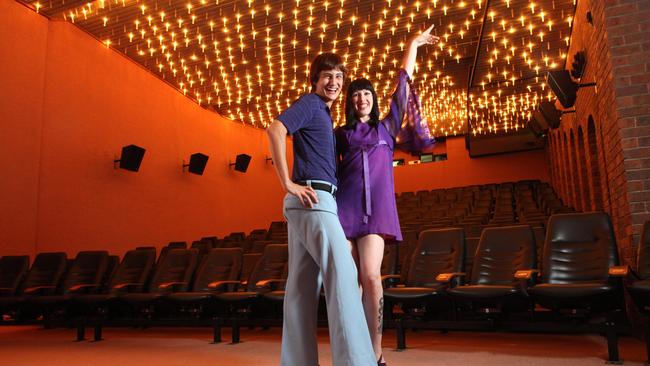Theatre demolition threatens millions in uni donations
Wealthy University of Queensland alumni are being urged to stop giving donations until UQ drops plans to demolish the Schonell Theatre.

Local
Don't miss out on the headlines from Local. Followed categories will be added to My News.
WEALTHY University of Queensland alumni are being urged to stop giving donations until UQ management drops plans to demolish the landmark Schonell Theatre.
The Schonell, UQ Union building, the Refectory, relaxation block and Forum will be replaced with a new performance venue as part of a $300 million makeover.
A new Student Hub and a new performance venue annexed to the University of Queensland Art Museum form the core of the revamp.
The university receives about $67 million a year from graduate donations and is actively “engaged with’’ about 17,000 of the 250,000 living alumni for which it has contact details.

Although much of the $67 million is from large donations from trusts and foundations, in 2017 the university received 1400 smaller “gifts’’ from alumni.
“We are asking people who receive messages from university fundraisers to hold off on any contributions until and unless the heritage dispute is satisfactorily resolved”, Jeff Rickertt, chair of the steering committee for the Schonell heritage campaign.
“This appeal will be sent directly to as many individuals and funding organisations as possible.
“We do not believe graduates would want their money misused to erase a part of their experience as students and reverse the spirit of inquiry and free association the student precinct represents.
“This action was proposed at an open forum at the university on February 25 and received good support.”
A university spokeswoman said: “UQ is open to exploring ways to acknowledge the fond recollections some people have of the Schonell Theatre and student complex.
“While we need to acknowledge our past, responsible investment decisions must be based on what will best serve current and future students.
“Our alumni community is extremely supportive and we are incredibly grateful for the ways in which they enable the university to invest in teaching and learning, innovation, and discovery that improves the lives of people worldwide.’’
UNIVERSITY TO BUILD REPLACEMENT SCHONELL
REPORT SHOWS LANDMARK CINEMA COULD BE SAVED
University of Queensland Union president Georgia Millroy said they could support replacement of the Schonell only if the new performing arts space was operated by the union.
“In the original Student Complex redevelopment plan, (Vice-Chancellor) Peter Hoj and UQ were silent as to the future of Schonell,’’ Ms Millroy said.
“The attitude of Peter Hoj and UQ only changed when student union representatives presented them with 8000 signatures on a petition to ‘Save Schonell’ and what it represents at UQ.
“Since UQU constructed and began operating the Schonell in 1970, the theatre has been a bastion of creative arts, critical debate and political independence at UQ.’’
She said the union feared management did not share its willingness to engage the student body in discussions around controversial topics, such as the Taiwanese Film Festival it facilitates.
“Even if UQ were willing to showcase critical and independent material, we fear that a donor or external interest who disagrees with a production could pressure UQ to shut it down,’’ she said.
“The union believes that the independence, critical thought and genuine student voice which has flourished within Schonell’s four walls will cease to exist within a theatre operated by UQ administration.
“In light of this, the union will only support a replacement of Schonell Theatre on the condition that it continues to be operated by UQU, the independent student union elected by students every year.’’
Mr Rickertt said student funds had paid for most of the buildings.

“The precinct was the most important site in Queensland for defending civil and social rights during Queensland’s long period of authoritarian government during the 1960s, 70s and 80s,’’ he said.
“The university management’s scheme to raze the precinct outlines spending of some $300 million for a vaguely set-out plan.
“It includes a lot of so-called entrepreneurial teaching stations, indicating the university wants to take over much of the area for its teaching and learning facilities — squeezing out many current uses.
“There is no guarantee that the traditional academic and social freedoms of the campus as a place for association and democracy will be preserved; none that the university management won’t appropriate control of the area from student bodies; and none that it won’t be commercialised on the lines of ordinary shopping malls off campus.’’


